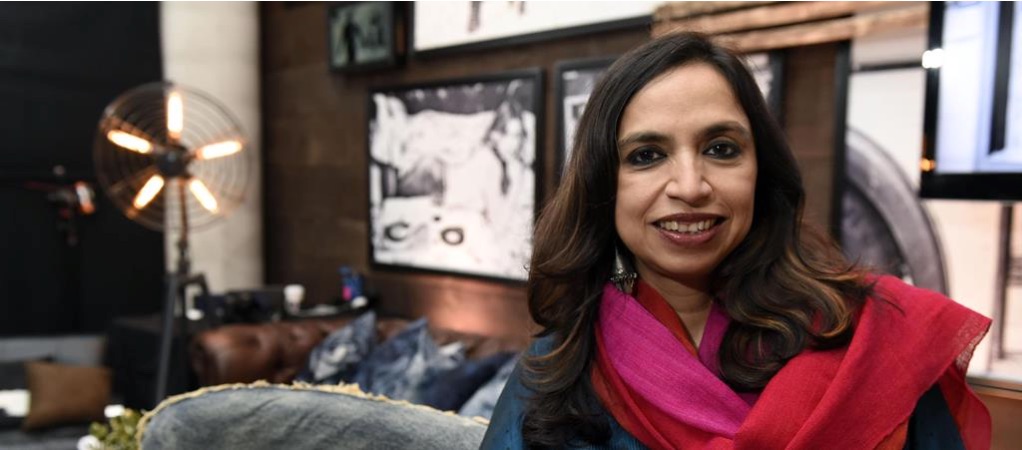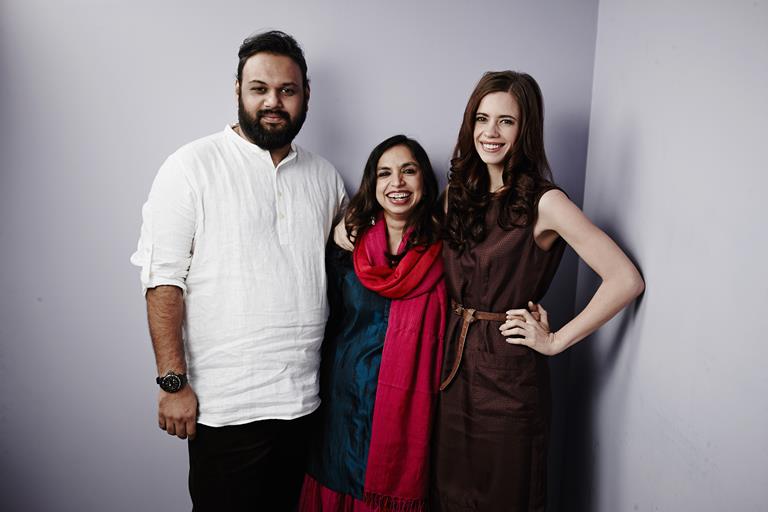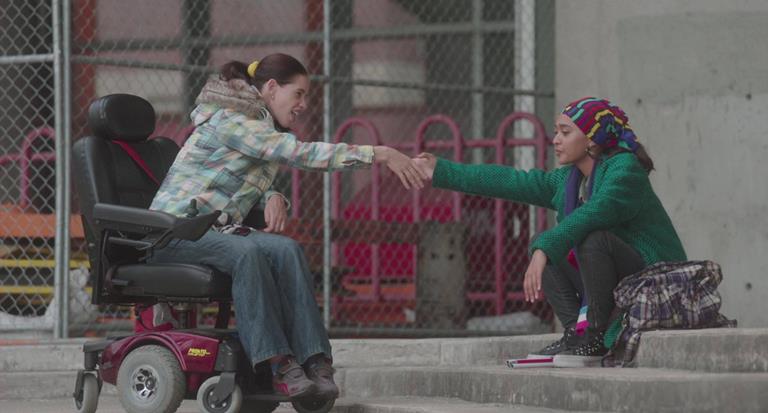APR 292015
Bringing a
Lesbian Love Story
to India
One way to sell the movie might be to say it’s about sex. About, as the director says, a “horny teenager.”
The harder sell is to say it’s about two LGBT women: one with cerebral palsy, one who’s blind. Also, they’re brown, and the movie is foreign. And you’re going to cry a lot, as this correspondent did. Whether because of the sex or the stamps of approval from Sundance (where it won an award at the screenwriters’ lab) and the Toronto International Film Festival (premiered, and won the NETPAC Award), Shonali Bose’s second feature film (which she wrote and directed), Margarita, With a Straw, is picking up steam. The 49-year-old Bose, an emerging darling of India’s artsier movie scene, is touring Margarita on a festival circuit these days. It’s her first in nine years.
“There’s been quite a lot of buzz” in India, particularly because of its star, Kalki Koechlin, a French-heritage actress with both mainstream Bollywood and indie Hindi flicks to her name, says Firstpost’s Hindi film critic Deepanjana Pal; she calls Koechlin’s performance “extraordinary.” Margarita follows main character Laila, played by Koechlin; she’s disabled, but the prominence of her disability soon gives way to her, well, horniness. She pretty much wants to bang someone for the first half. She watches porn (her mom finds it — eep!), crushes on guys, dumps one, and eventually falls into a romance with a blind Pakistani (eep again, for an Indian girl!) lesbian (eep, obviously!) while at school in New York.
Pal doesn’t entirely love the film, and she says it’s actually less groundbreaking in the Indian film world than you’d realize, as LGBT issues have been talked about for around a decade. But she says it is a standout for handling the differently abled: “It hasn’t been played with this level of performance.”
At a bar, Malini announced,
“I just want to have sex!”
Bose draws from a lot of autobiography in the film — “I was naked in this film,” she tells me. And she was metaphorically that naked every day on set, says her co-writer and co-director Nilesh Maniyar: “Most people have a personal and a professional self. She’s not like that.” She even, occasionally, cried in the middle of a shot; they’d keep rolling while he covered her mouth to keep her quiet, he says. It’s understandable why: Bose finished writing Margarita on her late son’s 17th birthday in January 2011 — he’d died the previous September — and it premiered a year later, to the day. (In a rare moment of privacy, she declines to say how he died.) That event “entirely influenced” how the writing went, she says. The story also channels her mother, who passed away when Bose was just 21. At the CAAMFest screening where I caught her in San Francisco, Bose is regal, wearing a black sari and a dignified hairdo; up close, she sports a crooked smile and speaks rapidly in a musical, cosmopolitan voice. She refers to the Sufi poet Rumi, whose quote closes the credits: “The wound is the place where the Light enters you.”
There’s more: She too is bisexual, discovered by way of a first love with an American student at age 19. Not a terribly easy affair to carry out in Delhi in the 1980s. When the film opens in India this April, it will be the first time a gay sex scene graces India’s (oft-censored) silver screens. Plus, Laila, the main character with cerebral palsy, is a version of Bose’s cousin Malini, an Oxford-educated novelist with a much rougher incarnation of CP, who typed her book with just one finger. Malini has never had sex — but loves to booze, necessarily with a sippy cup and a straw, hence the title — and Bose recalled an evening about 10 years ago when, at a bar, Malini announced, “I just want to have sex!” More than once, Bose recounts, Malini has thought she had a romantic admirer, only to discover that person was simply displaying kindness.
India is a tough place to be differently abled — there are poor roads for wheelchairs to navigate, and employment troubles; they’re sometimes “treated like freak shows,” Pal says. There’s little infrastructure. Talking about someone like Malini as if she were like anyone else, well, Pal says, “you have to be heroic every step of every day.”
Even the politics are personal. A former political science Ph.D. student at Columbia (she dropped out), Bose says she added scenes as world events unfolded during the filmmaking, like a #BlackLivesMatter protest, and the day of gay marriage legalization in New York. Now nearly divorced (she split from her scientist turned director husband the same year her son passed), she tells me her only real wish for her two sons was that they “not be right-wing!” She brags her late son had “come out as a Marxist,” and that the son who survives him is deeply concerned about the lack of a gender-neutral bathroom at his posh high school.
You get the sense she’s always been spunky — and open, as Maniyar says. Born to an actress and an electrical engineer turned sannyasi (a spiritual ascetic), Bose spent her earlier years as a star actress and debater. Had she stayed in India, she says, she’d have been an academic and done theater on the side. But after her mother’s death, she followed her then lover to the U.S., quit grad school, and began a six-week film course at NYU before heading to UCLA for a five-year film degree. Short films followed, and then the feature-length Amu, which picked up seven awards and premiered at Berlin’s and Toronto’s film festivals. She co-wrote Chittagong with her ex-husband, post-separation.
Her limitations are familiar to anyone who loves foreign, especially Indian, nonmainstream flicks. She’s been picked up for Japanese and Korean distribution — premiere dates TBD — to her great surprise. But in the U.S. and India alike, indie Hindi films have had a rocky time at the box office. One twist, this time around: The Hindi censor boards, famous for chopping away at the controversial, left most of the movie intact. Every single utterance of “fuck” stayed, Maniyar says. The only thing that went were about eight seconds of a lesbian sex scene. Which still leaves plenty of naked skin for the Indian audience to see.
Sanjena Sathian has an obsessive relationship with books, politics and instant noodles. You can find her downing espresso and ranting, on a good day. She talks very rapidly and apologizes if that’s unsettling.
>via: http://www.ozy.com/rising-stars/bringing-a-lesbian-love-story-to-india/40615#




